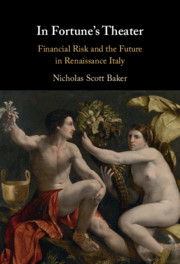Book contents
- In Fortune’s Theater
- In Fortune’s Theater
- Copyright page
- Contents
- Figures
- Preface
- Acknowledgments
- Note on the Text
- Introduction
- 1 Experts in Futurity
- 2 The Future in Play
- 3 Trust in the Future
- 4 The Mercantile Vocabulary of Futurity in Sixteenth-Century Italy
- 5 The Renaissance Afterlife of Boethius’s Moral Allegory of Fortuna
- 6 The Emerging of a New Allegory in Mercantile Culture
- 7 The Shifting Image of Fortuna
- 8 The Separation of Fortuna and Providence
- Conclusion
- Bibliography
- Index
Introduction
Histories of the Future
Published online by Cambridge University Press: 19 July 2021
- In Fortune’s Theater
- In Fortune’s Theater
- Copyright page
- Contents
- Figures
- Preface
- Acknowledgments
- Note on the Text
- Introduction
- 1 Experts in Futurity
- 2 The Future in Play
- 3 Trust in the Future
- 4 The Mercantile Vocabulary of Futurity in Sixteenth-Century Italy
- 5 The Renaissance Afterlife of Boethius’s Moral Allegory of Fortuna
- 6 The Emerging of a New Allegory in Mercantile Culture
- 7 The Shifting Image of Fortuna
- 8 The Separation of Fortuna and Providence
- Conclusion
- Bibliography
- Index
Summary
The future began in Italy around the year 1500. Between the last decades of the fifteenth century and the early decades of the sixteenth century, a new concept of futurity crystallized in the culture of the Italian city-states, taking shape in a wide variety of texts and images. Specifically, Renaissance Italians began to conceive of the future as an unknown and unknowable time-yet-to-come. What tomorrow or next week, next month, next year, or even the next one hundred years held was unknown and, therefore, open to the influence of human agency and random chance. The unknowability of the future held out the promise of opportunity and potential as well as the risk of loss and disaster. This conception of the future, as both unknown and unknowable, stood in contrast to the teachings of the Latin Church, in which time-yet-to-come was revealed in outline, even while it remained obscure in timing.
- Type
- Chapter
- Information
- In Fortune's TheaterFinancial Risk and the Future in Renaissance Italy, pp. 1 - 17Publisher: Cambridge University PressPrint publication year: 2021

